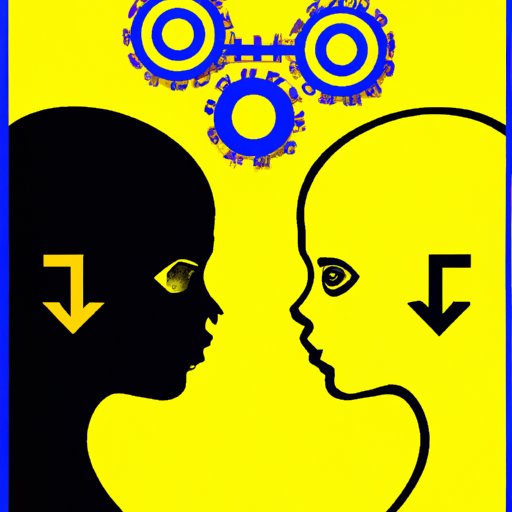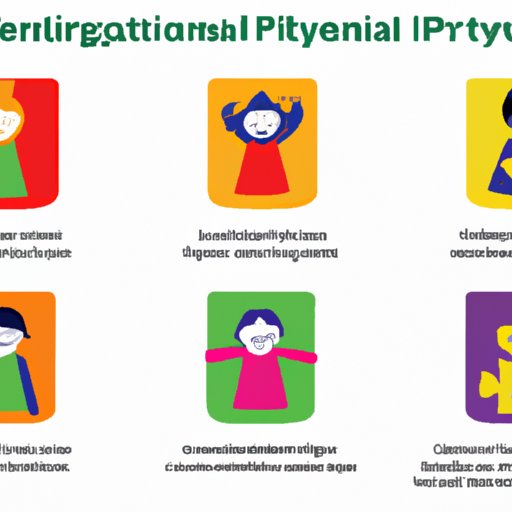I. Introduction
Personality is a complex construct that encompasses a wide array of behaviors, emotions, and thoughts that make each individual unique. While some personality traits are innate, other factors contribute to personality development. Understanding the factors that influence personality development can deepen our self-awareness and help us understand the people around us better. In this article, we will explore the factors affecting personality development, including The Big Five personality traits, the nature vs. nurture debate, childhood experiences, parenting styles, cultural influences, and relationships.
II. The Big Five: Exploring The Factors That Determine Personality Development
The Big Five personality traits, also known as the Five-Factor Model, are the most widely accepted framework for assessing personality. They are openness, conscientiousness, extraversion, agreeableness, and neuroticism. Each trait has distinct features that contribute to personality development.
Openness is characterized by imagination, creativity, and a preference for variety. Conscientiousness implies self-discipline, responsibility, and a tendency to plan ahead. Extraversion refers to social skills, assertiveness, and excitability. Agreeableness involves empathy, kindness, and a preference for harmony. Lastly, Neuroticism is associated with moodiness, anxiety, and emotional instability.
Research suggests that The Big Five traits are relatively stable over time and contribute significantly to personality development. Understanding our Big Five scores can help us know ourselves better and develop our strengths and weaknesses.
III. Nature vs. Nurture: The Influence Of Genetics And Environment On Personality
The nature vs. nurture debate is a long-standing discussion on the extent to which genetics and environment shape our individual differences. While genetics account for about 50% of personality traits, environmental factors play an essential role in determining personality development.
Genetics determine certain aspects of personality, such as temperament and basic cognitive capacity, and interact with environmental factors in shaping personality development. For example, children with a genetic predisposition for shyness may become more introverted as a result of social rejection or lack of social interactions.
On the other hand, environmental factors such as upbringing, socialization, and cultural values frame our experiences and shape our personality development. Families, schools, religions, and social norms influence behavior, emotion, and cognition and contribute significantly to personality development.

IV. The Impact Of Childhood Experiences On Personality Development
Childhood experiences set the foundation for personality development and shape the course of life. Early attachment, trauma, and parenting styles are examples of childhood experiences that impact personality development.
Attachment refers to the emotional bond between children and caregivers. Children who experience secure attachment develop a sense of trust and confidence that allows them to explore the world more effectively. In contrast, children who experience insecure attachment may become anxious, avoidant, or disorganized, leading to long-term personality problems.
Trauma in childhood, such as abuse, neglect, or instability, can lead to negative personality outcomes like anxiety, depression, personality disorders, and insecure attachment. However, positive experiences such as love, support, and a sense of autonomy can foster resilience and promote healthy personality development.
Parenting styles are also crucial for personality development in children. Authoritarian parenting styles can lead to low self-esteem, anxiety, and poor social skills. Permissive parenting styles can lead to impulsivity, lack of self-discipline, and underachievement. Authoritative parenting styles promote confidence, independence, and healthy relationships.
V. How Parenting Styles Affect Personality Development In Children
Parenting styles have long-lasting effects on personality development. Parenting styles can affect cognitive, social, and emotional development in their children which in turn, results in a different personality. Authoritative parenting styles result in children having healthy relationships and a positive self-concept. Permissive parents lead to their children’s unrestrained behavior and impulsiveness. Authoritarian parents, on the other hand, result in children who are shy, anxious, or depressed.
It has also been observed that parenting styles can influence other factors contributing to personality development. For instance, a child’s social skills and interpersonal relationships are often shaped by their parents’ behavior and discipline techniques towards them.
VI. Cultural Influences On Personality Development: An Anthropological Perspective
Culture is an important factor that affects personality development. Anthropologists argue that culture shapes behavior, emotion, cognition, and communication, contributing to personality development.
Cultural values, norms, beliefs, and practices shape how individuals perceive themselves, others, and the world. Cross-cultural studies show that different cultures prioritize different personality characteristics leading to variations in personality traits. For instance, individualistic cultures place a higher value on traits like independence, self-reliance, and assertiveness. In contrast, collectivist cultures favor traits such as cooperation, harmony, and conformity.
VII. The Importance Of Relationships And Socialization On Personality Development
Relationships play an essential role in shaping personality development. Peer groups, romantic partners, and other social relationships provide opportunities for socialization and reinforce personality traits.
Peer groups are particularly important during adolescence when individuals seek social acceptance, recognition, and identity. Adolescents who associate with prosocial peers, such as those who value education and healthy behaviors, may develop social skills and positive personality traits. In contrast, those who associate with delinquent peers may develop negative personality traits such as aggression, impulsivity, and substance abuse problems.
Moreover, romantic relationships in adulthood can have a profound influence on personality development. Long-term committed relationships can provide emotional security, intimacy, and support, promoting healthy personality development. In contrast, toxic relationships can cause emotional distress, low self-esteem, and personality disorders.
VIII. Conclusion
Personality development is a multifaceted construct that is affected by various factors. The Big Five personality traits, genetics, environment, childhood experiences, parenting styles, cultural influences, and relationships each play a vital role. Understanding these factors can help us develop our strengths, identify areas of improvement, and build beneficial social relationships that promote healthy personality development.
If you want to deepen your self-awareness, take an online assessment of The Big Five personality traits to learn more about your strengths and weaknesses. Additionally, enhance your personality development by seeking opportunities for socialization, healthy relationships, and self-improvement.
(Note: Is this article not meeting your expectations? Do you have knowledge or insights to share? Unlock new opportunities and expand your reach by joining our authors team. Click Registration to join us and share your expertise with our readers.)
